- Name of sport (game): Palio della Balestra
- Name in native language: Palio della Balestra
- Name of sport (game): Palla a Sfratto
- Name in native language: Palla a Sfratto
- Name of sport (game): Paradosiaki pali
- Place of practice (continent, state, nation):
Northern Greece
- Description:
Pali is played on grass, with music, outdoor, during the parish saint days feasts.No weight categories (only age).
Wrestlers wear only a heavy leather trouser called kispet,where they can grip. Attacks can be done on all the body. Oil makes difficult the attacks. The goal is to oblige the opponent to touch the ground with his back.Kispet is the name of the traditional leather shorts worn by the Paradosiaki Pali contestants whose bare chests and bodies are sprinkled with olive oil in this spectacular type of traditional Greek wrestling. The fight starts with a ritual in which the wrestlers douse themselves with oil to prepare for this slippery practice. The contestants begin the fight standing up but it develops mainly on the ground: now performed at very high technical levels, it is a particularly complex practice to be transmitted to the new generations.
- Sources of information :
Source of photos used in this article and gallery:
Photo Kazimierz Waluch, Festival Tocati - Festival Internazionale dei Giochi in Strada, Verona, Italy, 15-18 of September 2022 - Gallery:
- Name of sport (game): Pehlivanlar
- Name in native language: Pehlivanlar
- Place of practice (continent, state, nation):
East Bulgaria
- Description:
Pehlivanlar is played on grass, with music, outdoor, during the summer festivals, weddings and local feasts. No weight categories (only age).
Wrestlers wear only a heavy leather trouser called kispet,where they can grip. Attacks can be done on all the body. Oil makes difficult the attacks. The goal is to oblige the opponent to touch the ground with his back.
- Name of sport (game): Pelivansko borenje
- Name in native language: Pelivansko borenje
- Place of practice (continent, state, nation):
Former Yugoslav Republic of Macedonia, Kosovo
- Description:
Pelivansko borenje is played on grass, with music, outdoor, during the summer festivals, weddings and local feasts.
Wrestlers wear only a heavy leather trouser called kispet,where they can grip. No weight categories (only age). Attacks can be done on all the body. Oil makes difficult the attacks. The goal is to oblige the opponent to touch the ground with his back.
- Name of sport (game): pelota aragonesa
- Name in native language: pelota aragonesa
- Sources of information :
Books:
RIVAS, Félix A. El juego tradicional de la pelota en Aragón. Pirineos y extremo noroccidental. Trabajo de investigación inédito, Asociación Chuara, 2004
- Name of sport (game): Pelota Vasca/Pelote Basque
- Name in native language: Pelota Vasca
- Place of practice (continent, state, nation):
Basque Country, Spain, France
- History:
Document of establishing the Federación Internacional de Pelota Vasca.
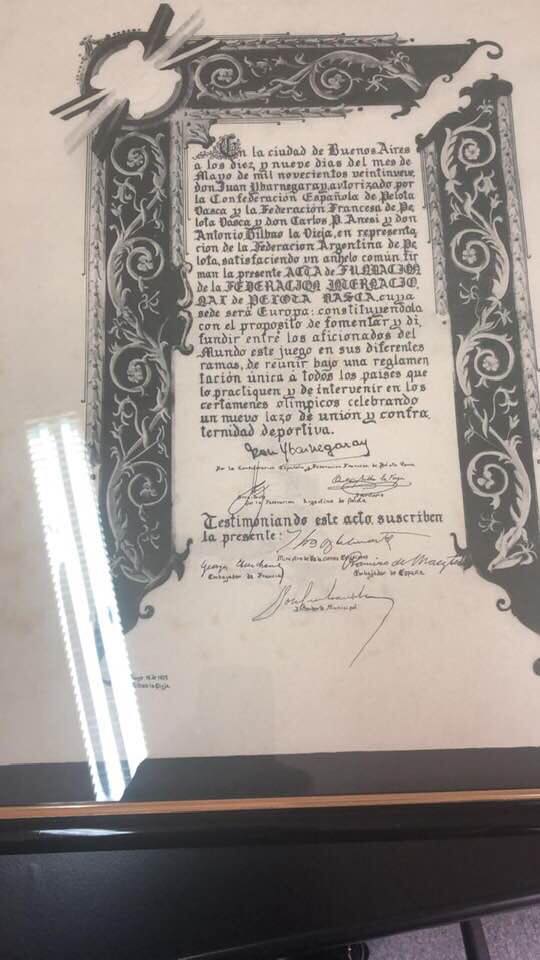
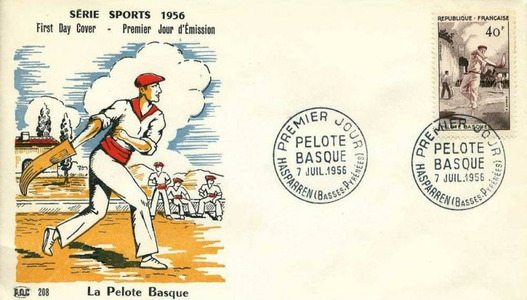
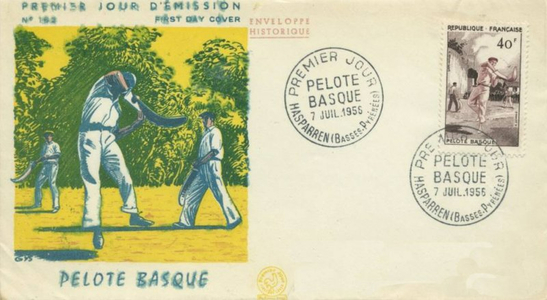
Source: https://www.wikitimbres.fr/timbres/86/pelote-basque
La Pelote Basque - french post card 1956
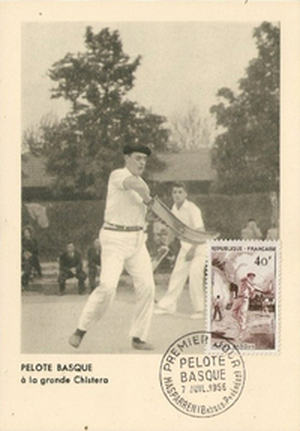
Source: https://www.wikitimbres.fr/timbres/86/pelote-basque
- Description:
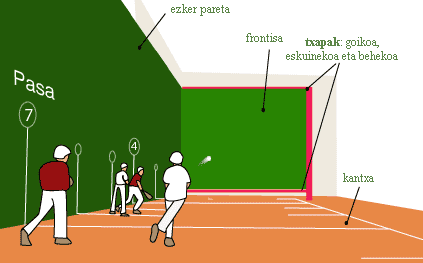
- Sources of information :
Video:
The Rules of Basque Pelota (Mano, Paleta & Chistera) - https://www.youtube.com/watch?v=DiQnm5orBas
- Documents:
 Miscelanea_de_datos_para_una_historia_del_juego_del_pelota.pdf
Miscelanea_de_datos_para_una_historia_del_juego_del_pelota.pdf


